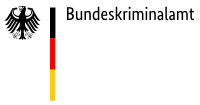The evidential value of forensic test results depends to a decisive extent on the quality of the police work at the scene of the crime and the securing of evidence traces.
 Forensic photography experts work in close contact with the scene of crime group. They perform special tasks in the securing and documentation of evidence and clues photographically. In order to reveal and record barely visible fingerprints on the most varied of substrates, the forensic photographers utilise a camera equipped with a particular lighting device and special software.
Forensic photography experts work in close contact with the scene of crime group. They perform special tasks in the securing and documentation of evidence and clues photographically. In order to reveal and record barely visible fingerprints on the most varied of substrates, the forensic photographers utilise a camera equipped with a particular lighting device and special software.
Since the creation of the scene of crime group at the BKA in 1974, the KTI can look back on a long and successful co-operation with a professional partner. In the initial years the scene of crime group and the KTI were strongly in demand, above all through the numerous terrorist activities of the Baader-Meinhof group, and the later Red Army Faction. The organisational separation of scene of crime from forensic work proved its worth, amongst other things, during the criminal proceedings that followed, owing to the fact that the demarcation of the scientific-technological analyses from the undoubtedly investigation-influenced tasks of the scene of crime group was very transparent. Due to the inevitable specialisation towards "general scene of crime work and scene of crime measurement" on the one hand, and "explosives, arson and bomb disposal" on the other, two service branches developed which perform the following tasks in the BKA's own investigations or at the request of the federal states:
- Tracing and securing evidence at the scene of the crime or at locations where evidence is found
- Crime scene measurement and reconstruction of the incident at the scene of the crime
- Advisory function in the protection against danger
- Bomb disposal measures
 By means of a 3D stripe-light scanner, tool marks or imprints can be recorded non-destructively and analysed using 3D software.
By means of a 3D stripe-light scanner, tool marks or imprints can be recorded non-destructively and analysed using 3D software.
By request, or in as far as German interests are affected, scene of crime officers also operate abroad. In cases of combating violent terrorist crime, the BKA scene of crime group is requested, and if necessary integrated as an operational unit into a special task force of the Federation or of the requesting states. Depending on the incident, KTI specialists are called in to provide advice at special scenes of crime, such as illegal narcotics laboratories or at scenes of crime typically involving shooting, explosives or arson.
 Progressive securing of fingerprints on remnants of an improvised explosive and incendiary device (IED)
Progressive securing of fingerprints on remnants of an improvised explosive and incendiary device (IED)
An investigation and bomb disposal team has been set up as a permanent alert force for explosive and incendiary devices. During operations, the task of this team is to provide the investigating agencies with comprehensive expertise on explosive materials and initiating devices as well as explosive and incendiary devices and to initiate and/or enact the associated necessary measures in the fields of both protection against danger and prosecution.
On conclusion of the scene of crime work, particularly with scenes of crime giving rise to complex evidence, so-called "forensic conferences" are held. In the context of these discussions, and on the basis of the evidence secured, all the relevant forensic science departments and the specialists from the scene of crime group decide together upon the optimal execution and sequence of further evidence-gathering and forensic analyses.
 Collective co-ordination of scene of crime and forensic experts regarding the aims and sequence of examinations
Collective co-ordination of scene of crime and forensic experts regarding the aims and sequence of examinations
In order to clarify special forensic questions arising from bomb attacks, the KTI arranges for comparison and reconstruction explosions and/or carries these out, partly with the participation of the scene of crime group.
 Securing evidence during a motor vehicle examination by taking samples by suction
Securing evidence during a motor vehicle examination by taking samples by suction
The scene of crime group collects all information nationwide in connection with explosives and arson offences, the information being supplied by the investigating agency via the reporting system for explosives and incendiary devices. Any information gathered from forensic tests is also fed into this data file.
Requests for examinations, pieces of evidence and technical inquiries on behalf of investigating authorities, scene of crime groups, State Criminal Police Offices, prosecutor’s offices, etc., reach the KTI in different ways.
The Forensic Science Isntitute’s in-house service department VAST (German: Vorgangs- und Asservatensteuerung), which stands for Procedure and Evidence Control, is responsible for the central administration of requests for examinations and pieces of evidence for the entire KTI and functions as the interface between clients and the units assigned with the examinations.
 Checking of received evidence
Checking of received evidence
VAST, with its control and correction functions, guarantees the reliable administration of standard requests and the coordination of complex requests that may include various and sometimes concurrent examinations. At the same time, VAST provides advice on all questions regarding the handling of evidence and test objects as well as the processing of examinations in a particular order.
.In summary, VAST functions as a hub within the KTI for all issues concering requests for examination, starting with their entry into the institute and ending with the delivery of an expert report.
